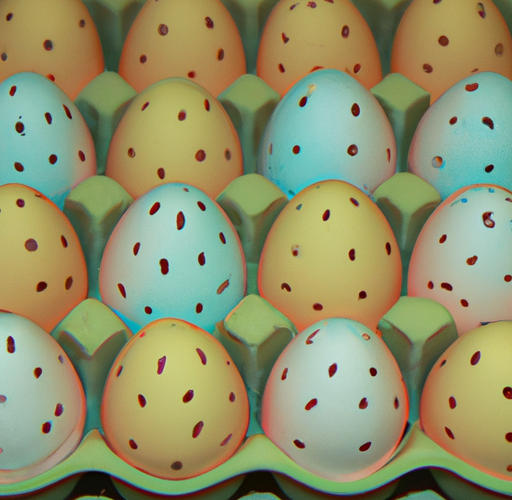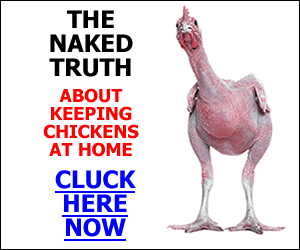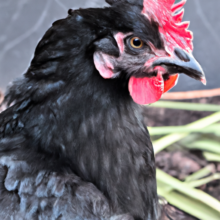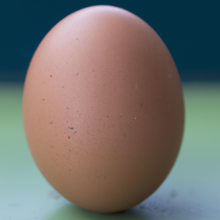The Easter Egger Reveal

Imagine the excitement of discovering a hidden surprise each time your chickens lay a new egg. This is the joy that comes with owning Easter Egger chickens. Aptly named for their ability to lay eggs of various colors, these beautiful birds are a popular choice among poultry enthusiasts. In this article, we will explore the fascinating world of Easter Egger chickens, learn about their unique traits, and uncover the mystery behind their mesmerizing egg-laying abilities. Get ready to be enchanted by the Easter Egger reveal!
The History of Easter Eggers
Easter Eggers are a unique and beloved breed of chickens that have captivated poultry enthusiasts for many years. Their rich history, distinctive physical characteristics, and friendly personalities make them a popular choice for backyard flocks. In this article, we will explore the origins of Easter Eggers, their recognition as a breed, their physical characteristics, personality traits, egg-laying habits, care requirements, common health issues, selecting Easter Egger chickens, integrating them into your flock, their suitability for urban settings, and answer some frequently asked questions about this delightful breed.
Origins of Easter Eggers
The origins of Easter Eggers can be traced back to the early days of chicken breeding in the United States. They are not a recognized breed with a specific breed standard but are instead a mixed breed that carries the distinctive gene for blue or green eggshell color. It is believed that Easter Eggers are the result of crosses between various breeds including Ameraucanas, Araucanas, and other blue or green egg-laying chickens. These crosses were made to enhance the egg-laying capabilities and create a unique and colorful appearance.
Recognition of Easter Eggers
While Easter Eggers are not officially recognized as a breed by poultry associations, they have gained significant recognition and popularity among chicken enthusiasts. Their distinctive eggshell color and friendly disposition have made them a favorite choice for backyard flocks. They have become so beloved that some hatcheries even specialize in breeding Easter Eggers and offer a wide variety of color patterns, feather varieties, and comb types.
Physical Characteristics of Easter Eggers
Easter Eggers exhibit a fascinating array of physical characteristics that make them visually appealing and easily recognizable.
Feather Varieties
Easter Eggers come in a range of feather varieties, including single, rose, and pea combs. They can have either clean or feathered legs and feet, giving them a unique and diverse appearance. Feather patterns vary widely among individuals, with some Easter Eggers displaying beautiful and intricate patterns, while others have a more plain or solid-colored plumage.
Color Patterns
One of the most exciting aspects of Easter Eggers is their remarkable color patterns. They can have solid colors, such as black or white, or display a combination of colors such as blue, red, and gold. Some Easter Eggers even have unique patterns such as lacing or mottling, which further adds to their individuality and charm.
Comb Types
The comb type of an Easter Egger can also vary, with some having a single comb, others having a rose comb, and some displaying a distinctive pea comb. These comb types add to the overall aesthetic appeal of the breed and make each individual Easter Egger truly one-of-a-kind.
Personality Traits of Easter Eggers
Easter Eggers are renowned for their friendly and docile nature, making them an ideal choice for families and individuals looking for a sociable and affectionate addition to their flock.
Friendly and Docile
Easter Eggers are known to be friendly towards humans and other chickens alike. They are often described as curious and enjoy interacting with their caretakers. Whether you’re a seasoned chicken enthusiast or a newcomer to chicken keeping, Easter Eggers will quickly become a beloved part of your flock.
Curious and Adventurous
Easter Eggers have a curious and adventurous nature, which makes them excellent foragers. They love to explore their surroundings and are often seen scratching the ground in search of tasty treats. Due to their natural curiosity, they may be more prone to wandering further afield, so ensuring they have secure housing and ample space to roam is essential.
Egg Laying Habits of Easter Eggers
One of the main attractions of Easter Eggers is their unique eggshell color. Let’s explore the variations in egg color and their egg production rate.
Egg Color Variations
Easter Eggers are known for their ability to lay eggs with various shades of blue, green, or even pink shells. The exact color can vary between individuals and even within a single hen’s laying cycle. This variability in eggshell color adds excitement and surprise to collecting eggs each day and makes Easter Eggers a popular choice for those looking to add some color to their egg basket.
Frequency of Egg Production
In general, Easter Eggers are reliable layers, typically producing around 250-300 eggs per year. The frequency of their egg production can be influenced by factors such as age, diet, and environmental conditions. While they may not be the most prolific layers compared to some specialized egg-laying breeds, their unique eggshell color and friendly demeanor more than make up for it.
Caring for Easter Eggers
Providing proper care and adequate housing is crucial to ensuring the health and well-being of your Easter Eggers. Let’s take a closer look at their housing requirements, feeding guidelines, and general maintenance needs.
Housing Requirements
Like any other chicken breed, Easter Eggers require a safe and comfortable living environment. This includes a well-insulated coop with proper ventilation, sufficient nesting boxes, and sturdy roosting bars. The coop should be predator-proof, with secure fencing or wire mesh to keep out potential threats. Outdoor space for foraging and dust bathing is also important, so providing a secure and spacious run is highly recommended.
Feeding Guidelines
Easter Eggers have similar dietary needs to other chicken breeds. They thrive on a balanced diet consisting of high-quality poultry feed supplemented with fresh fruits, vegetables, and occasional treats. Adequate access to clean water is essential at all times, especially during hot weather. Consult with a poultry nutrition expert or veterinarian to ensure your Easter Eggers receive the appropriate nutrition for optimal health and egg production.
General Maintenance
Regular maintenance tasks such as cleaning the coop, providing fresh bedding, and monitoring for signs of pests or disease are essential for keeping your Easter Eggers healthy. They should also receive routine health checks, including vaccinations and deworming, as recommended by a poultry veterinarian. Additionally, their toenails may need trimming periodically to prevent overgrowth and discomfort.
Common Health Issues of Easter Eggers
While Easter Eggers are generally hardy and resilient, they may still be susceptible to certain health issues. Let’s explore some common health concerns and how to identify and address them.
Molting
Molting is a natural process during which chickens shed and replace their old feathers. Some Easter Eggers may experience molting, typically during the fall or winter months. During this time, they may appear scruffy and stop laying eggs temporarily. Providing a balanced diet, plenty of fresh water, and ensuring they have a stress-free environment can help support them through the molting process.
Parasites
Like any other chicken breed, Easter Eggers can be affected by external and internal parasites such as mites, lice, and worms. Regularly inspecting your flock for signs of parasites and implementing a proactive parasite prevention plan, including regular cleaning and treatment, can help keep your Easter Eggers parasite-free and healthy.
Respiratory Problems
Respiratory problems can occur in any chicken breed, including Easter Eggers. Symptoms may include coughing, sneezing, wheezing, and difficulty breathing. If you notice any respiratory issues in your flock, it is important to address them promptly by isolating affected birds, improving ventilation, and seeking veterinary care if necessary. Proper biosecurity measures, such as limiting access to your flock and practicing good hygiene, can help prevent the spread of respiratory diseases.
Selecting Easter Egger Chickens
When selecting Easter Egger chickens to add to your flock, it’s crucial to choose from reputable breeders and evaluate the quality of the chicks or adult birds.
Choosing a Breeder
Researching and selecting a reputable breeder is essential to ensure you receive healthy and true-to-type Easter Eggers. Look for breeders who prioritize the health and well-being of their birds, provide appropriate housing and feeding practices, and maintain good breeding practices.
Evaluating Quality
When evaluating the quality of Easter Egger chicks or adult birds, consider factors such as physical appearance, temperament, and overall health. Look for birds with well-defined and distinct color patterns, vibrant and healthy plumage, and alert, curious behavior. Avoid birds that appear lethargic, have abnormal physical deformities, or show signs of ill health.
Integrating Easter Eggers into Your Flock
Introducing new chickens to an existing flock requires careful planning and consideration to ensure a smooth transition. This is particularly important when integrating Easter Eggers into your flock.
Quarantine Period
Before introducing Easter Eggers into your existing flock, it is essential to quarantine them for a period of at least two to three weeks. This quarantine period helps prevent the spread of potential diseases or parasites and allows you to observe the new birds for any signs of illness or aggression.
Integration Techniques
When it comes time to integrate your Easter Eggers into the main flock, there are several techniques you can employ to minimize stress and promote harmony. These include allowing the birds to interact through a wire mesh barrier, providing distractions such as treats and toys, and gradually increasing the amount of time the birds spend together. Close monitoring during the integration process is crucial to spot signs of aggression or bullying and intervene if necessary.
Easter Eggers in Urban Settings
The increasing popularity of urban chicken-keeping has led many enthusiasts to wonder if Easter Eggers are a suitable breed for urban settings. Let’s consider the main factors to keep in mind when considering Easter Eggers in an urban environment.
City Regulations
Before bringing Easter Eggers into an urban area, it is important to familiarize yourself with local regulations regarding chicken-keeping. Some cities may have specific rules regarding the number of chickens allowed, coop sizes, and noise restrictions. By adhering to these regulations, you can ensure a positive experience for both yourself and your community.
Urban Coop Design
Designing a suitable coop for Easter Eggers in an urban setting requires careful consideration of space limitations and aesthetics. Urban coops should be compact, efficiently designed, and visually appealing to meet neighborhood requirements, while still providing adequate space and security for your birds. Ensuring proper insulation and noise reduction measures can help minimize any potential disruptions to your neighbors.
Frequently Asked Questions about Easter Eggers
To provide further clarity about Easter Eggers, here are answers to some frequently asked questions:
What do Easter Eggers eat?
Easter Eggers have similar dietary requirements to other chicken breeds. They thrive on a balanced diet of high-quality poultry feed that provides essential nutrients. Supplementing their feed with fresh fruits, vegetables, and occasional treats can offer them a varied diet and help support their overall health and vitality.
How long do Easter Eggers live?
On average, Easter Eggers can live anywhere from 5 to 10 years or longer with proper care. Factors that can influence their lifespan include genetics, diet, healthcare, and the overall living conditions provided.
Can male Easter Eggers lay eggs?
No, male Easter Eggers, like all male chickens, are incapable of laying eggs. Only female chickens have the reproductive organs necessary for egg production. Male Easter Eggers can, however, contribute to breeding programs or simply provide companionship in a flock.
In conclusion, Easter Eggers are a delightful and beloved breed that offers unique eggshell colors, friendly personalities, and a rich history in poultry breeding. Whether you are a seasoned chicken enthusiast or a newcomer to chicken keeping, the addition of Easter Eggers to your flock can bring joy, charm, and colorful eggs to your backyard. By providing them with proper care, attention, and a suitable environment, you can enjoy the company of these unique chickens for years to come.



